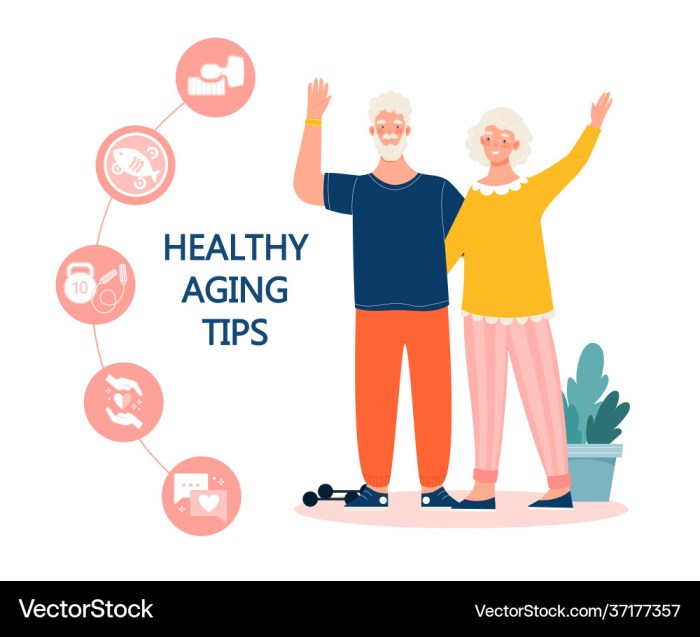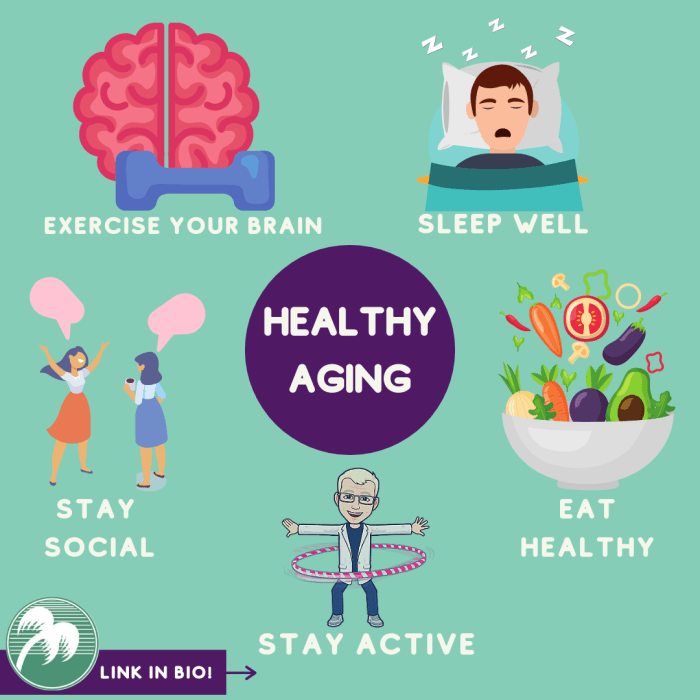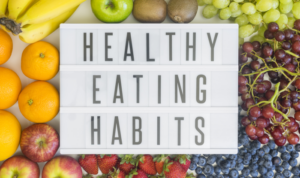Healthy aging is all about embracing the journey of getting older with vitality and grace. From physical fitness to mental well-being, this guide explores the keys to aging gracefully and living your best life.
Let’s dive into the essentials of healthy aging and discover how you can optimize your overall well-being as you grow older.
Introduction to Healthy Aging

Healthy aging refers to the process of developing and maintaining the functional ability that enables well-being in older age. It involves optimizing physical, mental, and social well-being to ensure a high quality of life as individuals grow older.
Ensuring healthy aging is crucial for overall well-being as it allows individuals to maintain independence, engage in meaningful activities, and enjoy a good quality of life in their later years. By adopting healthy habits and practices, individuals can reduce the risk of chronic diseases, maintain cognitive function, and stay active and socially connected.
Common Misconceptions about Aging
- Older adults are all frail and dependent: While some older adults may experience physical decline, many remain active, independent, and engaged in various activities.
- Aging means cognitive decline: While cognitive changes can occur with age, not all older adults experience significant decline in cognitive function. Engaging in mentally stimulating activities can help maintain cognitive abilities.
- Older adults are not interested in learning new things: Many older adults have a strong desire to learn and try new things, challenging the stereotype that they are not open to new experiences.
Factors Contributing to Healthy Aging
- Regular physical activity: Staying active helps maintain muscle strength, flexibility, and overall health.
- Healthy diet: Eating a balanced diet rich in fruits, vegetables, whole grains, and lean proteins supports overall health and well-being.
- Social engagement: Maintaining social connections and participating in community activities can reduce feelings of isolation and promote mental well-being.
- Mental stimulation: Engaging in activities that challenge the mind, such as puzzles, reading, or learning new skills, can help maintain cognitive function.
Physical Aspects of Healthy Aging
Regular exercise plays a crucial role in promoting healthy aging by maintaining muscle strength, improving balance, and enhancing overall mobility. Staying active can help prevent chronic conditions such as heart disease, diabetes, and osteoporosis.
Importance of Nutrition for Seniors
Nutrition is vital for seniors to maintain their health and well-being as they age. A balanced diet rich in fruits, vegetables, whole grains, lean proteins, and healthy fats can help prevent nutritional deficiencies and support immune function. Adequate hydration is also essential for seniors to stay healthy.
Tips for Maintaining Mobility and Flexibility
1. Engage in regular physical activity such as walking, swimming, or yoga to improve flexibility and mobility.
2. Practice balance exercises to reduce the risk of falls and maintain stability.
3. Incorporate strength training exercises to preserve muscle mass and bone density.
4. Stretch regularly to improve flexibility and prevent stiffness in muscles and joints.
Age-Related Changes in the Body and Management
– Loss of muscle mass: Combat muscle loss by including protein-rich foods in your diet and engaging in strength training exercises.
– Decreased bone density: Consume calcium-rich foods and perform weight-bearing exercises to support bone health.
– Joint stiffness: Stay active, stretch regularly, and maintain a healthy weight to reduce joint stiffness and improve flexibility.
– Reduced cardiovascular function: Perform aerobic exercises like walking or cycling to strengthen the heart and improve cardiovascular health.
Mental Well-being in Healthy Aging

As we age, maintaining cognitive health becomes increasingly important for overall well-being. Cognitive health refers to the ability to think, learn, and remember. It impacts our daily functioning, decision-making, and quality of life.
Significance of Cognitive Health in Aging
Cognitive health plays a vital role in healthy aging as it allows older adults to stay independent and engaged in activities they enjoy. It helps in preventing cognitive decline, such as memory loss and confusion, which are common concerns in aging individuals. By keeping the mind sharp, older adults can continue to lead fulfilling lives.
Strategies to Support Mental Wellness in Older Adults
- Engage in regular mental exercises like puzzles, reading, or learning a new skill to keep the brain active.
- Maintain a healthy diet rich in antioxidants, omega-3 fatty acids, and vitamins to support brain health.
- Stay physically active as exercise can improve blood flow to the brain and reduce the risk of cognitive decline.
- Get enough sleep as rest is essential for cognitive function and overall well-being.
Impact of Social Connections on Healthy Aging
Having strong social connections is crucial for mental wellness in older adults. Social interactions can help reduce feelings of loneliness and isolation, which are common risk factors for cognitive decline. Engaging with friends, family, or participating in community activities can provide emotional support and cognitive stimulation.
Activities to Maintain Cognitive Function
- Playing brain games or puzzles like Sudoku or crossword puzzles.
- Learning a new language or musical instrument to challenge the brain.
- Engaging in social activities like book clubs or volunteering to stay mentally active.
- Practicing mindfulness or meditation to reduce stress and improve cognitive function.
Emotional Health and Healthy Aging
Emotional well-being plays a crucial role in the process of healthy aging. As individuals grow older, they may face various emotional challenges that impact their overall quality of life. It is important to address these issues to ensure a positive and fulfilling aging experience.
Common Mental Health Concerns in the Elderly
As individuals age, they may experience common mental health concerns such as depression, anxiety, loneliness, and grief. These issues can be triggered by factors such as loss of independence, chronic illness, social isolation, or the passing of loved ones. It is essential to recognize and address these concerns to promote emotional well-being in older age.
Coping Mechanisms for Dealing with Emotional Challenges in Older Age
– Engaging in regular physical activity to boost mood and reduce stress.
– Seeking support from friends, family, or mental health professionals.
– Practicing relaxation techniques such as meditation or deep breathing exercises.
– Participating in social activities to combat loneliness and isolation.
– Maintaining a healthy diet and getting adequate sleep to support overall well-being.
Examples of How to Cultivate a Positive Mindset for Healthy Aging
– Adopting a gratitude practice by reflecting on positive aspects of life daily.
– Engaging in hobbies or activities that bring joy and fulfillment.
– Surrounding oneself with a supportive and positive social network.
– Practicing mindfulness and staying present in the moment.
– Setting realistic goals and celebrating achievements, no matter how small.


